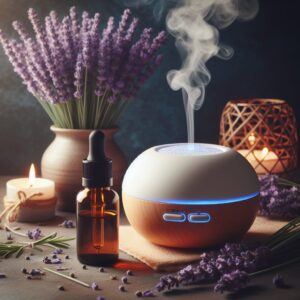
I’m going to start things off by brushing up on a time-honored tradition known as aromatherapy. You’ve probably heard of it before, but this isn’t just about smelling nice scents; it’s about harnessing the natural power of essential oils to promote relaxation and alleviate stress. A practice that has been around since ancient civilizations, aromatherapy has been a go-to for those looking to ease their minds and create a sense of harmony.
Now, stress isn’t a new buzzword or a contemporary fad – it’s an age-old human response that can have serious impacts on our overall health. That weight in your chest or the tension in your shoulders? It’s your body telling you something’s up. And if chronic, stress can lead to a load of unwelcome health issues that you certainly don’t want crashing your party. It’s vital to understand this to appreciate how essential oils might come into play.
So here’s where it gets interesting. There’s a growing body of scientific research suggesting that certain essential oils can really help in managing stress. That’s right – inhaling the soothing aromas of these oils or applying them to the skin can interact with the brain and the nervous system in a way that encourages relaxation and mood improvement. So, if you’re wondering how a little vial of oil can make a big difference in your stress levels, you’re going to find out about that in this article.
And just before we hop into the specific oils that can help to kick stress to the curb, I want to stress (pun intended) that using essential oils isn’t meant to be a lone wolf strategy. It’s part of an ensemble cast in the play of stress management. So, choose something that resonates with you, because after we cover the ‘what’ and ‘how,’ we’ll take a look at integrating these natural wonders into your daily routine for some real, tangible benefits.
Top Essential Oils for Stress Relief

Lavender oil is often the first choice when considering essential oils for calming effects. Known for its soothing properties, lavender oil has been widely studied. A 2012 study showed that inhaling lavender oil decreased anxiety and improved mood in participants. It’s great not just for winding down before bed but also for creating a tranquil atmosphere at any time.
Bergamot oil, with its fresh citrus scent, offers more than a pleasant smell. It contains compounds that can relieve tension and alter mood. Research has indicated that bergamot oil can help reduce corticosterone response to stress. If you’re looking for something that picks you up but also keeps the edge off, bergamot might be your go-to.
Ylang-ylang oil is known for its rich, floral scent and is touted for its ability to help with emotional upliftment. Perfect for those days when stress is coupled with a low mood, ylang-ylang can be a mood booster. Just don’t go overboard, as its heady fragrance can be strong; a little goes a long way.
What about those nights when stress keeps you tossing and turning? That’s where chamomile oil comes in. Championed for its mild sedative effects, chamomile oil can be a good ally in fighting insomnia. Notably, a study in 2017 linked chamomile tea consumption to improved sleep quality and depression reduction in postnatal women.
Lastly, frankincense oil, often used in meditation practices, can aid in deepening relaxation and mental quietude. It’s thought to help in diminishing feelings of anxiety and fostering a grounding experience. You might find it quite beneficial, especially when dealing with emotional turmoil or seeking a moment of peace.
Now, before you rush off to the nearest health store, remember that the quality of essential oils is paramount for effectiveness. Look for pure, organic, and sustainably harvested oils, as they’re more likely to retain the beneficial properties without unwanted additives.
Practical Ways to Use Essential Oils for Stress Reduction

Inhaling the soothing scents of essential oils is an age-old practice, and there’s a method to the madness. Diffusers are fantastic because they disperse the oil’s fragrance throughout the space, creating a tranquil atmosphere. If you don’t have a diffuser, no sweat, just place a few drops of oil in a bowl of steaming water and breathe in the steam; it’s almost like giving your senses a mini spa session.
If you’re the hands-on type, topically applying essential oils might be your thing. A word of caution: always dilute them with a carrier oil (like coconut or jojoba) to avoid skin irritation. Imagine combining a calming lavender oil with a carrier oil for a stress-relief massage – it’s like a double whammy of relaxation. And don’t forget you can add a few drops to your bath before bed, it can be a game-changer for winding down.
Maybe you’re ready to get creative and craft your stress-relief concoction by blending oils. Start simple: mix bergamot and ylang-ylang for an uplifting yet soothing blend, or create a nightly ritual with chamomile and frankincense to ease into sleep. Just remember to record your recipes so you can recreate the ones that resonate with you.
All of these methods come with a gentle reminder to prioritize safety. Essential oils are potent, and a little goes a long way. Always conduct a patch test for topical applications, and keep essential oils away from pets and young children.
Next, we’ll explore how aromatherapy fits into the bigger picture of stress management. It’s not just about catching that whiff of tranquility, it’s also about embracing other lifestyle changes that bolster your fight against stress.
Beyond the Aroma: Lifestyle Changes to Support Stress Management

You now know that essential oils can be powerful allies in your quest to reduce stress. But there’s more to the picture than just pleasant scents. To genuinely conquer stress, you’ll want to adopt a holistic approach. That’s going to include making some key lifestyle adjustments to strengthen your overall wellbeing.
In my opinion, journaling is like superfood for your mental health. Devoting a few minutes each day to this practice can make a significant difference. Imagine having a safe outlet for your thoughts and concerns. A place where there is no judgment or expectation—that’s what journaling can provide. And if you want to give it a try, numerous apps and articles can help you start.
Exercise should also be on your radar. It’s not just about staying fit—it’s a proven stress-buster that releases endorphins, also known as your body’s feel-good neurotransmitters. Whether it’s a brisk walk, a yoga session, or a dance-off in your living room, choose something that resonates with you and brings joy.
Don’t worry too much about overhauling your diet overnight, but do consider foods that support stress reduction. Think magnesium-rich leafy greens or antioxidant-packed blueberries. Incorporating these into your meals can support your nervous system and potentially ease stress.
Lastly, take a good look at your surroundings. Your environment plays a substantial role in how you feel. A cluttered space can lead to a cluttered mind. So, creating a serene and organized space can serve as a stress-relief sanctuary.
And remember, while all these strategies can offer substantial benefits, your first attempt doesn’t need to be your last. You can always adjust your approach down the road. If you’re finding that stress is still overwhelming after trying these methods, don’t hesitate to reach out to a healthcare professional. They can offer personalized strategies and support to help manage your stress levels effectively.
